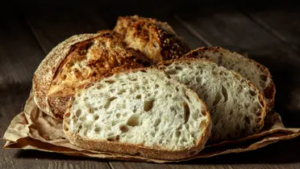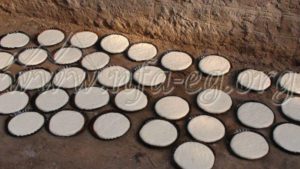Mokhammar Bread (Yeasted Bread)
Mokhammar Bread (Yeasted Bread) is one of the traditional types of bread baked specially in Upper Egypt. It is usually made during festivals, but could be used as part of the breakfast to be consumed with tea. In this case it is called Fayesh. The children sing during celebrations for this kind of bread saying:
“O pomegranate, you are red and new,
Tomorrow there will be kneading, and after will be Eid (Feast)”
This type of bread requires very high skills and cleverness in preparation from the ladies, and that is why it not baked a lot in houses. The difficulty is represented in making its specific yeast, called ‘Anz yeast (Goat yeast). This yeast is made using goat milk, and is prepared as follows:
- Goat milk is mixed with dry fava beans, and put in a pot called Barrad, tightly covered, and put in yet another clay pot filled with bran. This process is called Kamr, is it helps the yeast warm up without letting any air in.
- The yeast is formed producing bubbles, which allow the lady to know that the process has succeeded. The beans are then taken out of the yeast.
- A small amount of flour is added to a bowl, and the fermented milk is added and mixed together. This small piece of dough is a specimen that would foretell the success of the bread.
- The specimen is covered and left for about ten hours, after which the dough is checked. In case of success, then the whole process is repeated with larger amount of ingredients for the bread.
The yeast is added to the dough at the last stages, as it is very active and will make the dough hard to cut and shape.
Afterwards, the dough is put in moulds called Safayeh which are greased with ghee. It is then left in the sun, then in the shade before putting it in the oven using the Matraha (A circular tool with short or long handle that is made of wood or palm leaves, used for throwing the bread in the oven).
After taking it out of the oven, its surface is greased by a piece of dough covered with ghee.
Finally, the bread is cut into finger to produce the Fayesh.



